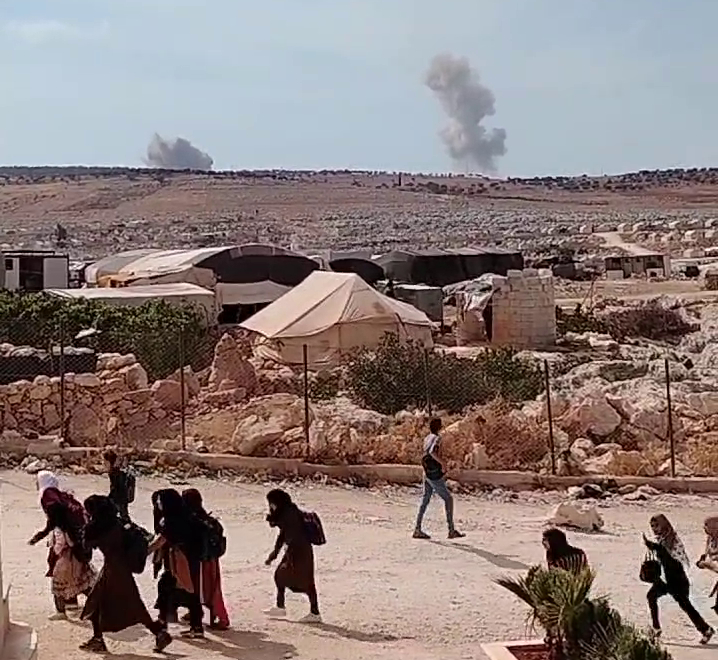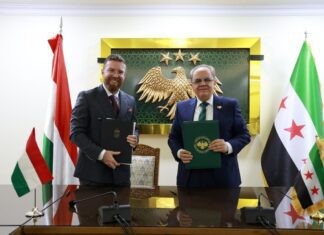
Russian airstrikes intensified across northern Syria today, in what analysts suspect is a precursor to a coordinated assault by Syrian regime forces and their Iranian allies, including Hezbollah. The attacks, targeting civilian areas in Idlib and Latakia provinces, have raised fears of escalation as the Assad regime, backed by Russia and Iran, seizes the opportunity to strike while much of the world’s attention is focused on the ongoing Israeli military operations in Gaza, occupied Palestine, and southern Lebanon.
At least six Russian warplanes have been conducting repeated airstrikes over liberated areas of Idlib, sowing terror in the already devastated region. The strikes numbered 21 by midday and targeted multiple locations, including the Kabina Hills in Latakia and several towns near Idlib. One particularly devastating attack struck near the Little Hearts School, an orphanage in Idlib province, triggering panic among the children and staff. Refugee camps across the region have also been affected, with many inhabitants fleeing to seek safety in areas less vulnerable to aerial bombardment.
These airstrikes come at a critical moment, with Russian forces seemingly coordinating their attacks with Assad’s army and Iran-aligned militias, including Hezbollah. This follows earlier reports that Moscow and Tehran have established a joint operations room and placed troops on the strategic hilltop of Tel El-Eis in Aleppo’s southern countryside.
While Russian jets are terrorizing the civilian population in northern Syria, Israeli forces continue to conduct air and ground operations in Gaza and southern Lebanon. Israeli troops have reportedly advanced approximately 500 meters into Syrian territory, setting up military outposts, all without facing resistance from Assad’s forces or their Iranian and Hezbollah allies, who appear to be concentrating their efforts on northern Syria.
This simultaneous surge in violence from both Russian and Israeli forces suggests a coordinated strategy, taking advantage of the global focus on the ongoing conflict between Israel and Hamas. Humanitarian organizations and analysts warn that the Syrian people are suffering immensely, as international attention is largely diverted by the Israeli-Palestinian conflict.
The Russian airstrikes appear calculated to spread fear among civilians. Witnesses describe scenes of chaos in refugee camps, with people rushing to evacuate as bombs fell. In Kabina, a strategically significant area due to its rugged terrain and proximity to regime-held territory, Russian planes have launched repeated strikes, attempting to weaken revolutionary forces entrenched there. Social media images from the Kabina Hills show plumes of smoke rising from the mountains, although exact details on casualties or damage are still unclear.
Despite the presence of a UN delegation in the region, tasked with inspecting camps for displaced persons, Russian warplanes carried out multiple raids west of Idlib city and on the forests surrounding the towns of Basanqul and Batenta. The timing of these attacks, coinciding with the UN visit, highlights the disregard for international norms and underscores the ongoing humanitarian crisis in northern Syria.
These airstrikes are believed to serve dual purposes. First, they aim to demoralize and weaken revolutionary groups, such as the Fathul Mubeen Operation Room (FMOR), tasked with defending liberated northern Syria. Secondly, these strikes aim to scatter the civilian population, creating waves of displacement and further destabilizing the region. Over 10,000 families have been forced to flee their homes in recent weeks due to ongoing shelling and airstrikes by both regime and Russian forces.
Meanwhile, Hezbollah and other Iranian-backed militias have increased their presence in northern Syria, focusing on fighting alongside Assad’s forces rather than confronting Israeli advances. This alignment of interests – allowing Israeli forces to operate uncontested in southern Syria while concentrating on northern fronts – has raised speculation of tacit agreements or mutual strategic benefits between these otherwise “opposing forces.” Israel, for its part, seems to be exploiting the Assad regime’s preoccupation with northern Syria to secure its own military objectives without interference from Damascus or Tehran.
The latest Russian bombing campaign has exacerbated an already dire humanitarian situation in northern Syria. Aid organizations have reported that nearly 650 attacks have occurred in the region since the beginning of the year, killing at least 54 people, including women and children. Schools, hospitals, and refugee camps have all been targeted in previous attacks, and today’s airstrikes have only worsened the plight of those living in Idlib and its surroundings.








